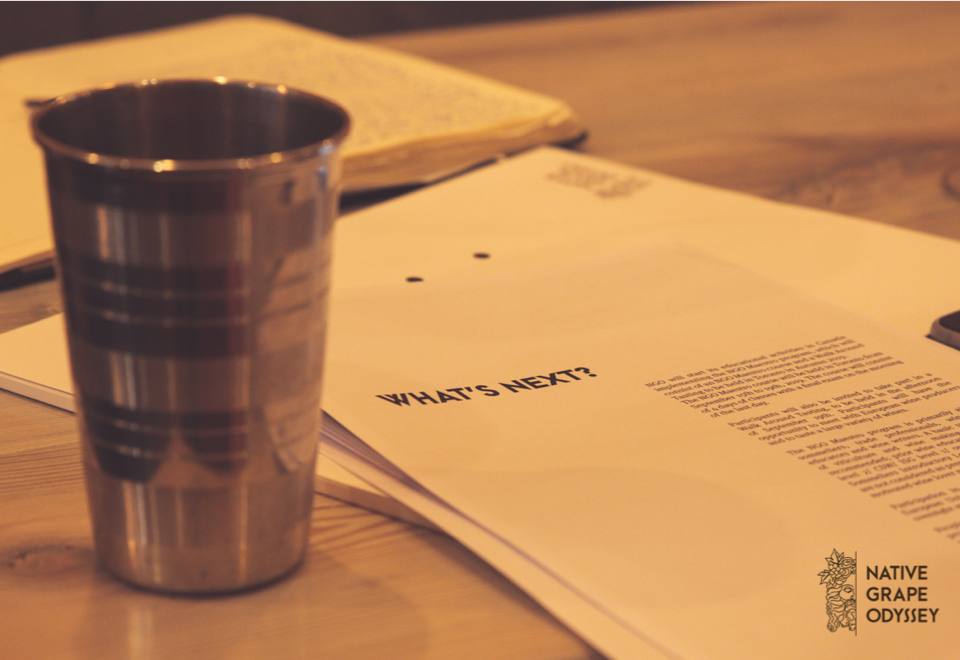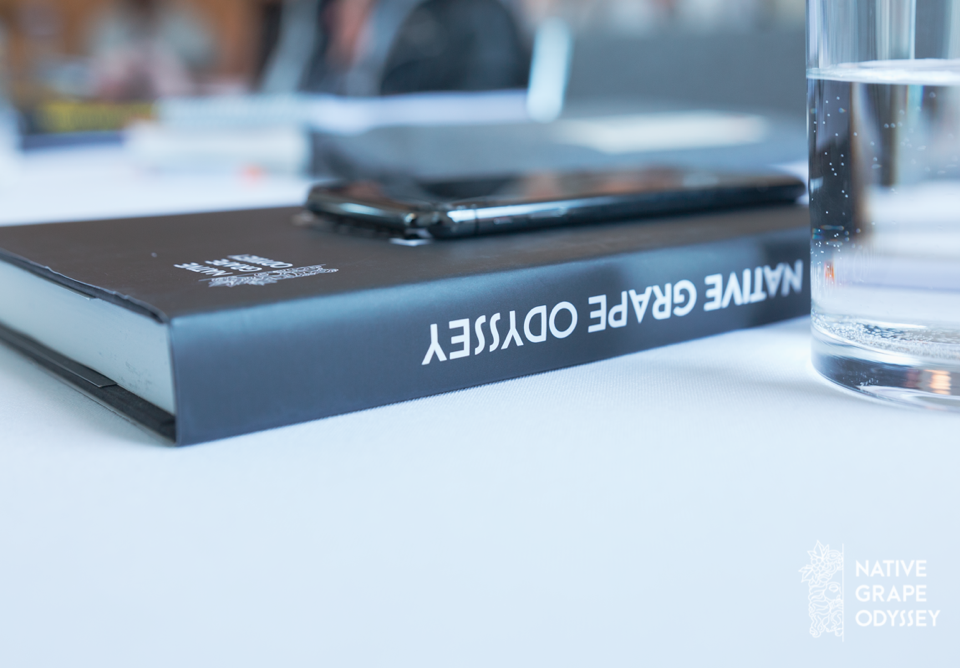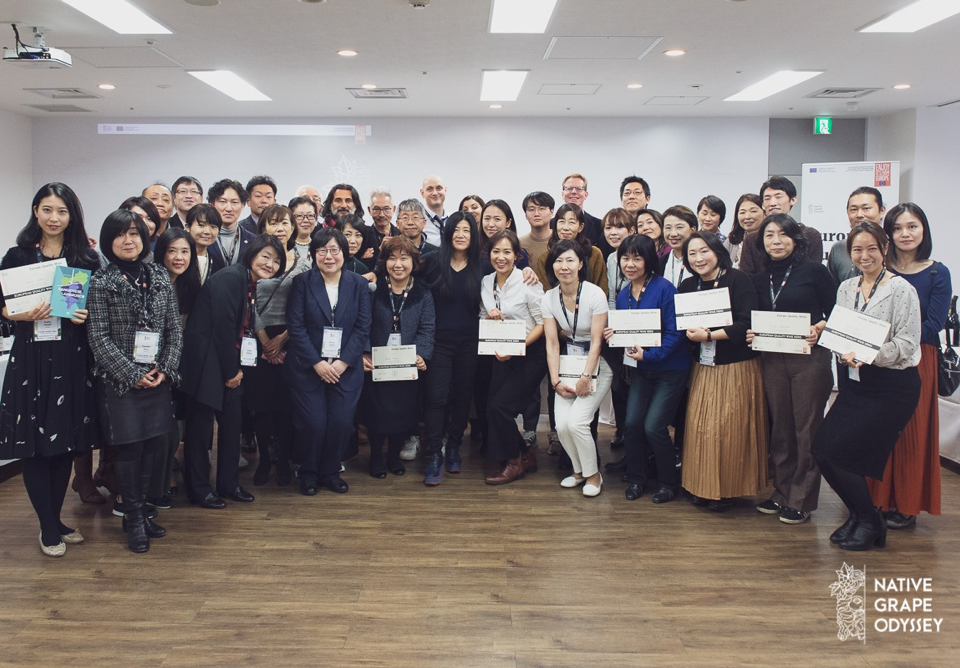
European High-Quality Wine to Conquer the World: the Native Grape Odyssey Program Launched at Vinitaly 2019
April 19, 2019
New statistics confirm it: European wine is conquering Canada
May 22, 2019The EU sponsored Native Grape Odyssey (NGO) program launched its inaugural series of events during Vinitaly between April 6th and 8th, 2019, in Verona, Italy, just over a month after the coming into effect of the much-anticipated European Trade Agreement (EPA) with Japan. Japan is an NGO target country (other than Russia and Canada) and the program hopes to further its educational goals by educating and demystifying EU wines made with native grapes, as well as meet the anticipated growth of European wines in the Japanese market.
The Native Grape Odyssey (NGO) project had invited 27 Japan-based wine industry experts to Verona, Italy during its flagship edition. The program’s activities were praised by all attendees who felt it provided an excellent opportunity to take part in an in-depth crash course in European wine, in the midst of Vinitaly, the largest wine and spirits fair on the continent. They also echoed the sentiment that education is exactly what is needed to further promote European high-quality products to foreign consumers.
The rolling out of the NGO educational program and the European Trade Agreement (EPA) are not mutually exclusive events, they go hand-in-hand, because of the incredible significance European wine has yet to play in the Japanese market. The EPA agreement went into effect on February 1st, 2019. This trade agreement opened the flood gates for trade between the EU and Japan. The talks between Japan and the EU have been ongoing since 2013 and there was a long lull between the two powers. When the US Trump administration decided to pull out of the Trans-pacific Partnership in 2016, this move provided the stimulus for Japan and the EU to complete their own negotiations, as many felt the US was being overly nationalistic and undermining international institutions in such a globalized era.
According to Prof. Emile Kirchner in his article for The Conversation, the EU-Japan economic agreement ultimately removes 97% of the tariffs that Japan applied to European goods and 99% of those applied by the EU. It is estimated that EU companies will save €1 billion a year in duties which they currently pay when exporting to Japan. Kirchner goes on to say that as Japan removed duties on agricultural products, Europeans stand to gain most from exports of consumer products, such as cheese, pork, and wines. The EU commission estimated that annual trade between the EU and Japan could increase by nearly €36 billion once the agreement is implemented in full.
Having forecasted the benefits that stood to be gained from the EPA, the EU invested in projects such as the Native Grape Odyssey program to help bolster awareness of European wine. The volume of product variety, especially in the wine industry, is daunting, it has been clear for some time that there are knowledge gaps and education is necessary to provide impetus to professionals and consumers, helping people to discern the difference between high quality wine and the latter. This EU sponsored educational project is seen as an injection of vigor in the hopes of reaching maximum potential in markets such as Japan’s, as well as supporting the importance of European culture and quality abroad.
The Native Grape Odyssey program took on the responsibility of providing a clear educational path forward and their flagship series of events in April was well received by all wine professionals in attendance. They exhibited a genuine interest in fulfilling their roles as spokespeople for EU wine in a seemingly Odyssean journey through a vast sea of grape varieties. Among the multitude of wine-related activities over the allotted three days, participants’ schedule encompassed two seminars on European native grapes hosted by Prof. Attilio Scienza, full professor at the University of Milan and leading expert in vine genetics and viticultural research. The first seminar—also co-led by Faculty member at the Vinitaly International Academy Henry Davar (IWE) for the tasting component—explored the close genetic relationship between Sangiovese and numerous other grape varieties in Italy. In the second seminar Scienza discussed some of oldest vines in the world, exemplifying the particular wines made with these grapes; the tasting session for this seminar was guided by Lynne Sherriff MW.

Subsequent interviews of the 27 participants from Japan helped sponsors and organizers to glean important insights into the current knowledge gaps and possible future trends of European wine imports to Japan. European wine has had a presence in Japan since the sixties, however, participants expressed that there is still lack of information, specifically with regards to European quality rankings and appellations in Japan. Taku Iguchi, owner of an Italian restaurant in Ōsaka, remarked, “When buying European wine, Japanese consumers usually do not look at appellations, but rather at the country of production and at the wine name”. Yasuhiko Motegi, Italian wine buyer at a wine-import company in Japan, expressed the same consideration: “There are many consumers with poor knowledge of European denominations of quality in Japan”.
These opinions support the value of the mission undertaken by the NGO program, and since there is anticipation to reap the benefits of a flowering market climate in Japan, many experts are keen to do their part in helping to spread the word of quality European products. Shigeru Hayashi, a leading Italian wine industry expert in Japan, is one of these individuals. Hayashi was invited to Vinitaly to hold a seminar on the ins and outs of Italian wine imports to Japan as well as on Japanese food and Italian wine pairing. He explained that since the EPA took effect, “from February 1st, 2019, large supermarket chains lowered prices on products such as Italian food and wine from 1% to 10%. Big importers lowered wine prices from 1% to 20% on March 1, 2019.” This bodes well for the European wine market in Japan, since lower prices should drive public interest and sales up. Programs like the NGO will be able to fill the need for more information, as their vision goes beyond basic education: they believe that the key to breaking real ground is to create spokespeople for European wine abroad, true wine heroes who can become guides for European-specific quality denominations. This mission will have important implications for the growth of European wines in the Japanese market in the coming years and this future is looking very bright.
About: Native Grape Odyssey is a project financed by the European Union and managed by Unione Italiana Vini and Zante Agricultural Cooperatives Union for the promotion of PDO and PGI European wines abroad, in particular in three countries: Japan, Canada and Russia. In order to achieve this, the Native Grape Odyssey educational program will organize wine seminars, workshops and b2b meetings both in these countries and in Verona, Italy, inviting wine experts and influencers from these countries. These events, realized in the span of three years (2019-21) aim at creating awareness about European native wines abroad, in particular Italian and Greek wines, which share a long tradition and a high standard of quality.



